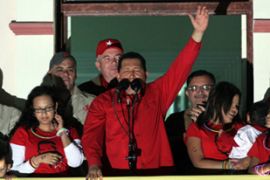Chavez wins Venezuela referendum
Venezuela president hails victory in poll to scrap term limits.

Tibisay Lucena, the chief of the national electoral council, said that with 94 per cent of the vote counted, 54 per cent had backed the president’s proposal – an unbeatable lead.
Festive mood
There was a festive mood on the streets of the capital, as Chavez supporters began celebrating the result.
|
In depth |
|
Caracas split over Chavez changes In pictures: Venezuela votes Q&A: Chavez referendum Join the debate on Venezuela’s referendum Students battle over Venezuela vote Video: Venezuelans to vote on Chavez Video: Venezuela votes amid economic woes Video: Chavez claims referendum |
“People here are ecstatic,” Al Jazeera’s Rob Winder, reporting from Chacao district in Caracas, said.
“There are hundreds of people in the street – people are riding around on motorbikes and dancing on the roofs of cars.”
Chavez said he received a first message of congratulations from Fidel Castro, Cuba’s former president and a mentor of Chavez.
“Dear Hugo, congratulations for you and for your people for a victory that, by its size, is impossible to measure,” Castro wrote, according to Chavez.
However opposition party members criticised Chavez for using state funds to sponsor his referendum campaign.
“This was the campaign with most abuses of public resources that we have ever seen,” Carlos Vecchio, a member of an opposition party, told AFP news agency.
Venezuela has been divided by the referendum, which seeks to amend five articles of the country’s constitution to grant the president, mayors, local councilors, legislators and governors unlimited bids for re-election.
The vote was Chavez’s second attempt to remove the two-term cap for presidents.
The win means he can seek re-election when his second term in office ends in 2013 and hold the presidency for as long as he continues to win elections.
Without the amendments, the president is only allowed to hold two consecutive terms, which would mean that Chavez, elected in 1998 and again in 2006, would have to step down at the end of his second mandate.
Opposition defeated
The result is a huge blow for Venezuela’s opposition which had made gains in city and state elections last year.
Opposition parties had pinned their hopes on a student movement spearheading the “No is No” vote, a reference to Chavez’s failed effort in 2007 to push through constitutional changes to extend his presidency.
Chavez had previously described winning the vote as key to completing his transformation of Venezuela into a socialist state.
His supporters say he has given poor Venezuelans cheap food, free education and quality health care and empowered the poor, after decades of US-backed governments that favoured the rich.
 |
| Chavez supporters poured on to the streets of Caracas to celebrate the win [Reuters] |
But analysts warn that Chavez’s social programmes could be hard hit by tumbling oil prices.
“Independently from this referendum Chavez is facing a very acute financial and political crisis in the very near term,” Gustavo Coronel, a former board member of the Venezuelan state oil company and an opponent to Chavez, told Al Jazeera.
“So far he has been instituting a policy of handouts that have been very good for him. He is very popular among the poor because he has received more than $700bn in the last 10 years,” he said.
“[But] the oil prices have plummeted … I doubt this referendum really means a victory for him in the longer term. I think that, in fact, he might be fighting for his life before the end of the normal term of 2012.”
Gabrial Elizondo, Al Jazeera’s correspondent in Puerto Ordaz in Venezuela’s Bolivar province, said that it has to be noted that Chavez “got 54 per cent of the vote – and that is not an overwhelming mandate by anybody’s estimation. This does not guarantee him a permanent rule by any stretch of the imagination.
“This is really an example of democracy in motion, and it is a victory for Chavez … but also keep it in perspective … he is going to have to go through another election if he wants to continue his presidency just in a few more years.”
About 100 international observers monitored the vote, but neither the Organisation of American States (OAS) nor the European Union had official observers in Venezuela.
